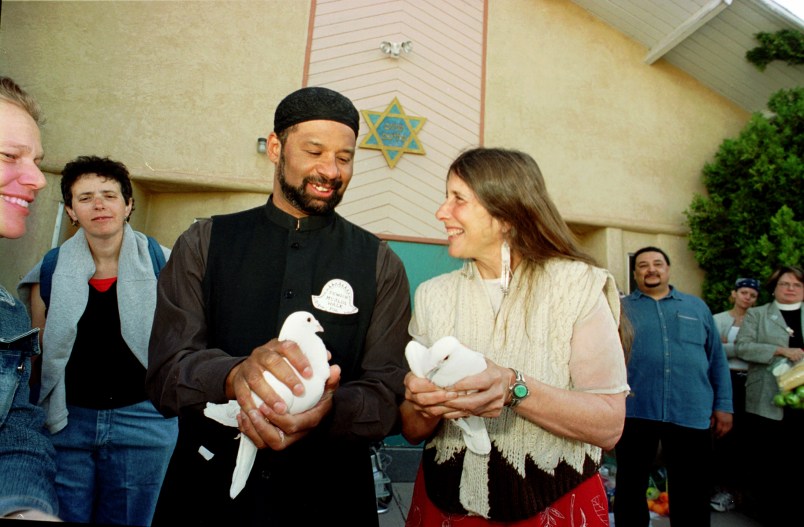I don’t find this terribly surprising. But it is a highly notable, really key part of the broader debate about how the right-wing uses and distorts the debate over anti-Semitism, Islamophobia and religious diversity in the United States. The Institute for Social Policy and Understanding has a new public opinion report out on Islamophobia and Americans’ attitudes toward Muslims. The report covers a lot of ground and includes an easily accessible range of charts that makes it easy to dip into. I recommend it to you. What I want to focus on is one key finding: of all religious or ethnic groups in America, Jews have by far the most positive attitudes toward Muslims.
Equally striking: by far the most negative attitudes toward Muslims are held by white evangelicals.
As I said, the results with respect to Jews does not surprise me that much based on my own experience. But it is so out of whack with much of the public narrative about Jews and Muslims in the United States that it really demands our attention.
In some ways it would not be surprising if it were otherwise. Both the Jewish American and Muslim American communities have strong affinities with either side of the bloody and deeply aggrieved Israel/Palestine conflict. It would hardly be surprising if that had seeped into attitudes between Jews and Muslims in the United States. But these numbers show pretty clearly that it has not or to the extent it has it has been heavily countervailed by other factors.


I had to smirk a bit when I noticed in this second chart that American Jews are barely more Islamophobic than American Muslims themselves. Why would this be? The better question might be why do white evangelicals hate Muslims so much. But there are a number of clues.
One unsurprising finding is that Islamophobia is highly correlated with not knowing any Muslims.

Jews are most likely to know a Muslim, white evangelicals the least likely.

I’m not certain why this latter part is true. I would suspect it’s at least partly due to Jews being concentrated in major metropolitan areas where American Muslims also tend to be concentrated. It’s probably rooted in other factors of social isolation or integration that are not tied to geography.
When they broke down attitudes by ethnicity, Hispanics had the most positive attitude toward Muslims.

It’s not immediately clear to me why Hispanics would be more favorably inclined toward Muslims than the population at large. The report notes that “being a Democrat” and having “favorable views of other minorities” was linked to lower levels of Islamophobia. Again, not terribly surprising given our politics. That does give some insight into why Jews and Hispanics stand out in this way. So some of this is probably simply that Hispanic Americans tend to be Democrats. But that explanation doesn’t hold up with African Americans, who have relatively high levels of Islamophobia relative to other groups who tend to be Democrats.

I’m curious whether the fact that many Hispanic Americans have relatively recent immigrant histories, either individual or familial, may simply make Hispanic less prone to xenophobic attitudes in general.

Looking at all the data, there are clearly a number of overlapping factors that account in part for Jews having such low rates of Islamophobia. Democrats in general score much lower; Jews are overwhelmingly Democrats. Knowing a Muslim is inversely correlated with Islamophobia; Jews tend to live in regions of urban concentration where Muslims also tend to live. But even when these factors are broken out there is clearly a big part of equation that is tied to being Jews, which is to say the community’s unique historical and communal experience.
It’s a fascinating study with lots of information worth absorbing on its own terms. But given recent events this was my big takeaway: A huge amount of our public debate in this country, a lot of it driven by the GOP and particularly white evangelicals, portrays Jews as locked in some sort of deep or even existential contest with American Muslims. That’s clearly just not true. Polling data demonstrates this clearly. Indeed, the generally positive attitudes Jews have toward Muslims are generally mutual.

Most of this public narrative is – as some of us probably suspected – really about the hostility of white evangelicals and conservatives who use Jews as symbols or stalking horses or mascots to explain and advocate an antipathy Jews mainly don’t share.






